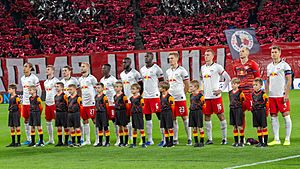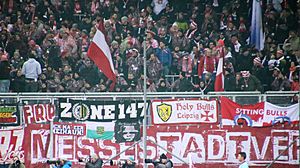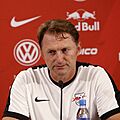RB Leipzig facts for kids
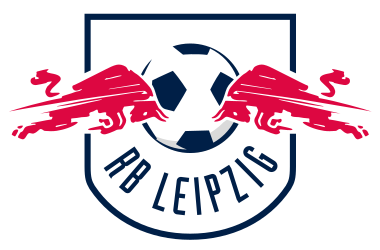 |
|||
| Full name | RasenBallsport Leipzig e.V. | ||
|---|---|---|---|
| Nickname(s) | Die Roten Bullen (German for 'The Red Bulls') | ||
| Short name | RBL | ||
| Founded | 19 May 2009 | ||
| Ground | Red Bull Arena | ||
| Capacity | 47,800 | ||
| Owner | Red Bull GmbH (99%) (of GmbH) | ||
| Head coach | Ole Werner | ||
| League | Bundesliga | ||
| 2020–21 | Bundesliga, 2nd of 18 | ||
|
|
|||
RasenBallsport Leipzig e.V. (which means "Lawn Ball Sports Leipzig"), usually called RB Leipzig, is a professional football club from Leipzig, Saxony, Germany. The club was started in 2009 by the company Red Bull GmbH. They bought the playing rights of a lower-league team, SSV Markranstädt, with a goal to reach the top German league, the Bundesliga, within eight years.
RB Leipzig plays its home games at the Red Bull Arena. Their nickname is "The Red Bulls" (Error: {{language with name/for}}: missing English translation (help)). After being founded, RB Leipzig quickly moved up through the German football leagues. They started in the fifth division and earned promotions almost every year. They finally reached the Bundesliga in the 2015–16 season.
In their first season in the top league, 2016–17, they finished second. This amazing result meant they qualified for the UEFA Champions League for the first time ever. They have since become a regular team in the Champions League, even reaching the semi-finals in 2020. The club won its first major national trophies, the DFB Pokal, in 2022 and 2023.
RB Leipzig's quick rise has been a big topic in German football. Some people don't like that a company has so much influence over the club, as German football usually has clubs owned by their members. However, others are happy that RB Leipzig has brought top-level football back to the former East Germany, where it had been missing for a long time.
Contents
Club History
Starting the Club: 2006–2009
Before investing in Leipzig, the company Red Bull GmbH looked for a good place to invest in German football for over three years. They considered cities like Hamburg and Munich, but decided Leipzig was the best choice.
Red Bull first tried to get involved in German football in 2006. They wanted to invest in FC Sachsen Leipzig, a local club. However, the German Football Association (DFB) said no to their plan to rename the club "FC Red Bull Sachsen Leipzig." The DFB was worried about too much company influence. After protests from fans, Red Bull stopped their plans there.
Red Bull then looked at clubs in West Germany, like FC St. Pauli and TSV 1860 Munich, but these talks didn't lead anywhere. In 2007, they tried to invest in Fortuna Düsseldorf. Again, fans protested, and the DFB rules prevented a company from owning most of a club or changing its name for advertising.
Leipzig was a good choice because it has a rich football history. It was where the DFB was founded and home to the first German champions, VfB Leipzig. However, by the 2000s, no Leipzig team had played in the Bundesliga since 1994. The city had a large population and a big stadium, the Zentralstadion, which was used for the 2006 FIFA World Cup.
Instead of buying an existing top-division club, which would be expensive and face legal issues, Red Bull decided to start a new club. This way, they could design the club how they wanted. In early 2009, Red Bull contacted the Saxony Football Association about starting a new club.
A new club would need a playing license. To avoid starting in the lowest league, they looked for a club in the fifth division, the Oberliga, which didn't need DFB approval. They found SSV Markranstädt, a small club near Leipzig. SSV Markranstädt agreed to sell its Oberliga license to Red Bull.
RasenBallsport Leipzig e.V. was officially founded on May 19, 2009. All seven founding members worked for Red Bull. The club chose the name RasenBallsport (Lawn Ball Sports) because DFB rules didn't allow a corporate name like "Red Bull Leipzig." But by using the initials "RB," the connection to Red Bull was still clear.
RB Leipzig took over SSV Markranstädt's first team and its Oberliga license. They also needed junior teams for the license, so they acquired four junior teams from FC Sachsen Leipzig, which was having financial problems.
RB Leipzig played its first season at the Stadion am Bad in Markranstädt. The plan was to move to the much larger Zentralstadion in Leipzig soon. Red Bull GmbH secured the naming rights for the Zentralstadion, and it was renamed the Red Bull Arena. The club aimed to reach the Bundesliga within eight years and even hoped to win the German championship one day.
Rising Through the Leagues: 2009–2016
RB Leipzig played its first match on July 10, 2009, a friendly game they won 5–0. Their first official league match on August 8, 2009, ended in a 1–1 draw. They quickly became strong in the 2009–10 NOFV-Oberliga Süd season, finishing first and earning promotion to the Regionalliga Nord.
In 2010, the club moved its home games from Markranstädt to the Red Bull Arena in Leipzig. The stadium opened with a friendly match against FC Schalke 04. RB Leipzig finished 4th in their first Regionalliga season, missing out on promotion. However, they won their first trophy, the Saxony Cup, in 2011, which also qualified them for the DFB-Pokal.
In the 2011–12 DFB-Pokal, RB Leipzig famously beat Bundesliga club VfL Wolfsburg 3–2 in the first round. They finished 3rd in the Regionalliga that season, again missing promotion.
The 2012–13 Regionalliga Nordost season was very successful. They won the league and the Saxony Cup again. This meant they had a chance to qualify for the 3. Liga. They played against Sportfreunde Lotte in a playoff, winning 4–2 on aggregate. This promoted them to the 3. Liga.
In the 2013–14 season, RB Leipzig played in the 3. Liga for the first time. They had a great season, finishing second and earning direct promotion to the 2. Bundesliga. They were the first team to get promoted to the 2. Bundesliga after just one season in the 3. Liga.
Before the 2014–15 season, the German Football League (DFL) had some concerns about RB Leipzig. They felt the club was too controlled by Red Bull GmbH and needed to be more independent. As a compromise, RB Leipzig agreed to change its club crest and make sure its management was more independent from Red Bull.
RB Leipzig continued to invest in new players. In the 2014–15 DFB-Pokal, they reached the round of 16 for the first time. They finished the 2014–15 season in fifth place.
For the 2015–16 season, RB Leipzig spent more money on new players than all other 2. Bundesliga clubs combined. They aimed for promotion to the Bundesliga. In a DFB-Pokal match against VfL Osnabrück, the game was stopped and later awarded to RB Leipzig after a lighter was thrown from the stands.
During the 2015 European migrant crisis, RB Leipzig showed great support for refugees. The club donated money, provided housing containers, and started an initiative called "Willkommen im Fußball" to help refugee children play football.
RB Leipzig secured second place in the league and direct promotion to the Bundesliga on May 8, 2016, after beating Karlsruher SC. This was a huge achievement, reaching the top league within seven years of their founding.
Bundesliga Era: 2016–Present
RB Leipzig had an amazing first season in the Bundesliga, 2016–17. They were undefeated in their first thirteen league matches, setting a new record for a promoted team. They even reached first place in the league, becoming the first team from former East Germany to do so since 1991.
On April 15, 2017, RB Leipzig qualified for a European tournament for the first time. They then secured a spot in the 2017–18 UEFA Champions League on May 6, 2017.
In the next season, they finished 6th in the league. They also reached the quarter-finals of the 2017–18 UEFA Europa League after moving from the Champions League group stage.
In the 2018–19 Bundesliga season, RB Leipzig finished 3rd, qualifying for the 2019–20 UEFA Champions League. They also reached the DFB-Pokal final for the first time, but lost 3–0 to Bayern Munich.
In the 2019–20 UEFA Champions League, RB Leipzig won their group. They then beat Tottenham Hotspur and Atlético Madrid to reach the semi-finals. However, they lost 3–0 to Paris Saint-Germain.
Under coach Domenico Tedesco, RB Leipzig reached the semi-finals of the 2021–22 UEFA Europa League. They also won their first major trophy, the DFB-Pokal, in 2022, beating SC Freiburg in the final.
On June 3, 2023, RB Leipzig won their second DFB-Pokal title in a row, defeating Eintracht Frankfurt 2–0. They also won their first DFL-Supercup on August 13, 2023, beating Bayern Munich 3–0. In the 2024–25 Bundesliga season, RB Leipzig finished seventh, missing out on European competition for the first time since their promotion in 2016.
Team Colors and Crest
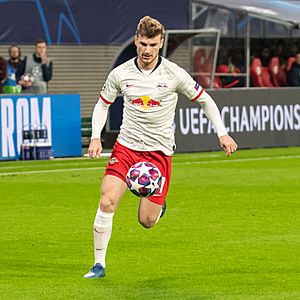
RB Leipzig plays in red and white, the traditional colors of Red Bull football teams. When the club was founded, the Saxony Football Association rejected their first crest ideas because they looked too much like the Red Bull company logo. So, the team played its first season without a crest.
Later, RB Leipzig proposed a new crest, which was accepted in May 2010. This crest was a bit different from other Red Bull teams' logos. However, the German Football League (DFL) rejected it in 2014. As part of a deal with the DFL, the club agreed to redesign its crest again. The current crest is different from other Red Bull teams' logos. It features a football instead of a yellow sun, and the "RB" initials are at the bottom.
Kit Suppliers and Shirt Sponsors
| Period | Supplier | Shirt Sponsor | Sleeve sponsor |
|---|---|---|---|
| 2009–2014 | Adidas | Red Bull | None |
| 2014–2017 | Nike | ||
| 2017–2021 | CG Immobilien | ||
| 2021–2022 | CG Immobilien / Veganz (in cup and UEFA matches) |
||
| 2022–2023 | AOC Die Stadtentwickler / Veganz (in cup and UEFA matches) |
||
| 2023–2024 | AOC Die Stadtentwickler / IHG Hotels & Resorts (in cup and UEFA matches) |
||
| 2024–present | Puma |
Stadium
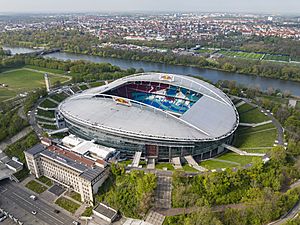
RB Leipzig played its first season at the Stadion am Bad in Markranstädt. It had 5,000 seats. The club planned to move to the much larger Zentralstadion in Leipzig. Red Bull GmbH secured the naming rights for the stadium, and it was renamed "Red Bull Arena" on July 1, 2010. The contract for the stadium name runs until 2040. The stadium officially opened as Red Bull Arena on July 24, 2010, with a friendly match.
The Red Bull Arena had a capacity of 44,345 seats in 2014–15. In March 2015, RB Leipzig announced plans to invest 5 million euros to improve the stadium. This included expanding VIP areas, press boxes, and wheelchair spaces. It also added new large LED scoreboards and updated player facilities. The stadium's capacity was reduced to 42,959 seats before the 2015–16 season due to these changes.
For a long time, the Red Bull Arena was an all-seater stadium. However, in the 2021–22 season, Sector B, where home supporters gather, was changed to a standing area.
Attendance Records
RB Leipzig has set several attendance records at the Red Bull Arena.
- On July 29, 2011, 31,212 fans watched their first DFB-Pokal match against VfL Wolfsburg.
- On May 3, 2014, a record 42,713 spectators watched RB Leipzig secure promotion to the 2. Bundesliga against 1. FC Saarbrücken.
- On March 4, 2015, the stadium was completely sold out for the first time, with 43,348 fans watching a DFB-Pokal match against VfL Wolfsburg.
- The Saxony Cup final in 2011 set a new record with 13,958 spectators. This record was broken in 2013, when 16,864 fans watched the final.
- A qualifying match for the 3. Liga in 2013 set a new record for a fourth-tier match, with 30,104 spectators.
On October 4, 2015, RB Leipzig played its 100th match at the Red Bull Arena. By then, over 1.4 million fans had attended their matches, averaging about 14,643 spectators per game. In their first Bundesliga season (2016–17), the team averaged 41,454 spectators, filling 97% of the stadium.
Average Home League Attendances
| Season | Average attendance |
|---|---|
| 2009–10 | 2,150 |
| 2010–11 | 4,206 |
| 2011–12 | 7,401 |
| 2012–13 | 7,563 |
| 2013–14 | 16,734 |
| 2014–15 | 25,025 |
| 2015–16 | 29,441 |
| 2016–17 | 41,454 |
| 2017–18 | 39,397 |
| 2018–19 | 38,380 |
| 2019–20 | 28,819 |
| 2020–21 | 1,059 |
| 2021–22 | 22,124 |
| 2022–23 | 45,559 |
| 2023–24 | 45,175 |
| 2024–25 | 45,045 |
Stadium Expansion Plans
In October 2014, there were reports that the club wanted to expand the Red Bull Arena to 55,000 seats. This would make it one of Germany's largest football stadiums. There were also talks about building a completely new stadium north of Leipzig, possibly with up to 80,000 seats.
However, in December 2016, RB Leipzig decided to buy the Red Bull Arena from its owner, Michael Kölmel. This meant they would no longer pursue building a new stadium. The stadium was expanded, and the work was finished in 2021. The total capacity is now 47,069 spectators for national games.
Training Center
In 2010, Red Bull announced plans to build a training center and youth academy in Leipzig. They invested about 30 million euros in the project. The training center is located at Cottaweg.
The construction happened in two phases. The first phase, opened in August 2011, included several pitches with modern features like floodlights and heating. The second phase, which began in 2014, aimed to create one of Germany's largest training centers. This phase cost an estimated 35 million euros.
The new sports complex opened in September 2015. It is used by the professional team and six junior teams. It has an indoor hall, a running track, weight rooms, medical facilities, and relaxation rooms for players. It also includes a media center, offices, a boarding school for young players, and a café. The RB Leipzig training center is considered one of the most modern in Germany.
The club has plans for even more expansions to the training center in the future.
Supporters
Fan Clubs and Groups
As of August 2023, RB Leipzig has 68 official fan clubs. The oldest is L.E Bulls, and Bulls Club claims to be the biggest. There are also unofficial fan groups like Rasenballisten and Fraktion Red Pride. RB Leipzig also has some smaller "ultras" groups, such as Red Aces and Lecrats. By March 2016, about 5,000 RB Leipzig supporters were part of organized groups.
Fan clubs and supporter groups are part of a union called Fanverband RB Leipzig Fans, started in 2013. This union helps different fan groups work together. They meet regularly to discuss ideas and concerns, which are then shared with club officials.

Some fan groups at the Red Bull Arena are known for being independent. Groups like IG Rasenballisten and Lecrats focus on the club's Leipzig identity and the passion of the fans, rather than just the Red Bull company. They often avoid official club merchandise and the commercial name of the stadium.
The Rasenballisten group also makes a clear statement against racism: "Together for Leipzig – Rasenball against Racism." This message can be seen on their scarves and banners in the stadium.
Fans at Away Games
RB Leipzig supporters often travel in large numbers to away matches. In February 2016, nearly 2,500 fans went to an away game against St. Pauli. A month later, 2,800 supporters traveled to Nuremberg. In their first two Bundesliga seasons, more than 7,000 fans attended away games in Dortmund, Munich, and Berlin. In 2018, over 9,000 fans traveled to Berlin for the last away game of the season.
Club Organization
The Association (e.V.)
RasenballSport Leipzig e.V. is a registered voluntary association. It has a management board and a supervisory board. In 2014, changes were made to these boards to meet rules from the German Football League (DFL). These rules, called the "50+1 rule," aim to prevent outside companies from having too much control over a club's decisions. The club declared that the management board would mostly be made up of people independent of Red Bull.
The association is in charge of the men's junior teams (U8 to U14) and all women's football teams.
Membership
Becoming a voting member of RasenballSport Leipzig e.V. is very limited. Unlike most other German football clubs, there isn't an easy way for the public to become a voting member. The club has stated it wants to avoid having a very large number of members like some other clubs.
When the club was founded, it had only 9 members, all employees of Red Bull. In 2014, the membership fee was very high (100 euros to join, 800 euros annually), and the club could reject applications without giving a reason.
The DFL pushed for changes to this policy. In response, in June 2014, the club introduced "official supporting members." These members pay an annual fee (between 70 and 1000 euros) to support junior football. They get certain benefits, like meeting the team, but they do not have voting rights. However, supporting members do have one representative on the supervisory board.
The GmbH (Limited Company)
In December 2014, the association voted to create a separate company called RasenballSport Leipzig GmbH. This company is responsible for the professional team, the reserve team, and men's junior teams from U15 and older.
As of 2015, Red Bull GmbH owns 99% of RasenballSport Leipzig GmbH, with the association owning the remaining 1%. However, because of the "50+1 rule," the association still holds the majority of votes, ensuring it has formal power over the club's decisions.
Sponsorships
RB Leipzig's kits were first made by Adidas. In 2014, the club switched to Nike, in a deal expected to last until at least 2025. The club also has sponsorship deals with companies like Hugo Boss, Porsche (for youth teams), and Volkswagen.
In March 2020, RB Leipzig, along with Borussia Dortmund, Bayern Munich, and Bayer Leverkusen, donated 20 million euros to help other German football teams that were struggling financially during the COVID-19 pandemic.
Players
Current Squad
|
|
Players on Loan
|
|
Notable Players
Most Appearances
Statistics are correct as of November 12, 2024.
- The ten players with the most games played are listed.
- This includes all matches and substitute appearances.
- Players in bold are still playing for RB Leipzig.
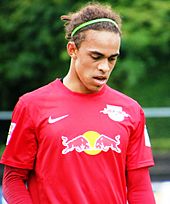
| Rank | Player | Nationality | Position | Tenure | Apps |
|---|---|---|---|---|---|
| 1 | Yussuf Poulsen | Forward | 2013–2025 | 410 | |
| 2 | Willi Orbán | Defender | 2015– | 348 | |
| 3 | Péter Gulácsi | Goalkeeper | 2015– | 338 | |
| 4 | Lukas Klostermann | Defender | 2014– | 326 | |
| 5 | Emil Forsberg | Midfielder | 2015–2023 | 325 | |
| 6 | Kevin Kampl | Midfielder | 2017– | 279 | |
| 7 | Marcel Halstenberg | Defender | 2015–2023 | 240 | |
| 8 | Marcel Sabitzer | Forward | 2014–2021 | 229 | |
| 9 | Diego Demme | Midfielder | 2014–2020 | 214 | |
| 10 | Timo Werner | Forward | 2016–2020, 2022– | 213 |
Top Goalscorers
Statistics are correct as of November 12, 2024.
- The ten players with the most goals are listed.
- Players in bold are still playing for RB Leipzig.
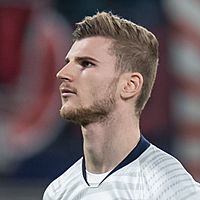
| Rank | Player | Nationality | Position | Tenure | Goals |
|---|---|---|---|---|---|
| 1 | Timo Werner | Forward | 2016–2020, 2022– | 113 | |
| 2 | Yussuf Poulsen | Forward | 2013– | 92 | |
| 3 | Daniel Frahn | Forward | 2010–2015 | 87 | |
| 4 | Emil Forsberg | Midfielder | 2015–2023 | 71 | |
| 5 | Christopher Nkunku | Forward | 2019–2023 | 70 | |
| 6 | Marcel Sabitzer | Midfielder | 2014–2021 | 52 | |
| 7 | Loïs Openda | Forward)|Midfielder | 2023– | 34 | |
| Dominik Kaiser | Midfielder | 2012–2018 | |||
| 9 | Willi Orbán | Defender | 2015– | 30 | |
| 10 | Dani Olmo | Forward | 2020–2024 | 29 |
Team Captains
- Players in bold are still playing for the club.
| Captain | Nationality | Years | Notes |
|---|---|---|---|
| Ingo Hertzsch | 2009–2010 | ||
| Tim Sebastian | 2010–2011 | ||
| Daniel Frahn | 2011–2015 | ||
| Dominik Kaiser | 2015–2017 | ||
| Willi Orbán | 2017–2020, 2023– | ||
| Marcel Sabitzer | 2020–2021 | ||
| Péter Gulácsi | 2021–2023 |
Staff
Current Staff
Coach History
| No. | Head coach | Nationality | From | Until | Days | Notes |
|---|---|---|---|---|---|---|
| 1 | Tino Vogel | 1 July 2009 | 30 June 2010 | 364 | ||
| 2 | Tomas Oral | 1 July 2010 | 30 June 2011 | 364 | ||
| 3 | Peter Pacult | 1 July 2011 | 30 June 2012 | 365 | ||
| 4 | Alexander Zorniger | 1 July 2012 | 11 February 2015 | 954 | ||
| 5 | Achim Beierlorzer | 11 February 2015 | 30 June 2015 | 139 | Note 1 | |
| 6 | Ralf Rangnick | 1 July 2015 | 30 June 2016 | 365 | ||
| 7 | Ralph Hasenhüttl | 1 July 2016 | 16 May 2018 | 684 | ||
| 8 | Ralf Rangnick | 9 July 2018 | 30 June 2019 | 356 | ||
| 9 | Julian Nagelsmann | 1 July 2019 | 30 June 2021 | 730 | ||
| 10 | Jesse Marsch | 1 July 2021 | 5 December 2021 | 157 | ||
| 11 | Achim Beierlorzer | 5 December 2021 | 9 December 2021 | 4 | Note 1 | |
| 12 | Domenico Tedesco | 9 December 2021 | 7 September 2022 | 272 | ||
| 13 | Marco Rose | 8 September 2022 | 30 March 2025 | 934 | ||
| 14 | Zsolt Lőw | 30 March 2025 | 30 June 2025 | 92 | Note 1 | |
| 15 | Ole Werner | 1 July 2025 | 241 |
Notes
- Interim coach.
Season History
| Season | League | Pos | W | D | L | GF | GA | Pts | DFB-Pokal | ||
|---|---|---|---|---|---|---|---|---|---|---|---|
| 2020–21 | Bundesliga | 2nd | 19 | 8 | 7 | 60 | 32 | 65 | Runners-up | ||
| 2021–22 | Bundesliga | 4th | 17 | 7 | 10 | 72 | 37 | 58 | Winners | ||
| 2022–23 | Bundesliga | 3rd | 20 | 6 | 8 | 64 | 41 | 66 | Winners | ||
| 2023–24 | Bundesliga | 4th | 19 | 8 | 7 | 77 | 39 | 65 | Second round | ||
| 2024–25 | Bundesliga | 7th | 13 | 12 | 9 | 53 | 48 | 51 | Semifinals | ||
| Green marks a season followed by promotion | |||||||||||
European Competitions
Overview
RB Leipzig first played in European football in the 2017–18 UEFA Champions League, after finishing second in their first Bundesliga season. It was very quick for a club to reach the Champions League after only eight years of existence.
Another club, FC Red Bull Salzburg from Austria, also qualified for the Champions League that year. This raised questions about whether the two clubs were too closely linked by Red Bull. However, after looking into it, UEFA decided that both clubs were independent enough to play in their competitions.
In the 2017–18 UEFA Europa League, both RB Leipzig and Red Bull Salzburg reached the quarter-finals. They did not play each other. In the next season, they were drawn in the same group. Salzburg won both games against Leipzig. Leipzig did not make it out of the group that year.
UEFA Club Ranking
As of August 29, 2024
| Rank | Team | Points |
|---|---|---|
| 10 | 81.500 | |
| 11 | 78.000 | |
| 12 | 76.000 | |
| 13 | 75.000 | |
| 14 | 73.000 |
RB Leipzig Affiliated Teams
RB Leipzig has several affiliated teams, including a women's team and various junior and academy teams.
Relationship with Red Bull Salzburg
In 2005, Red Bull bought a club in Salzburg, Austria, and renamed it Red Bull Salzburg. The goal was to create a top team there. Over time, Leipzig became Red Bull's main football project. Many players moved from Salzburg to Leipzig, which sometimes made Salzburg fans upset because their best players were leaving. Both clubs also share youth and scouting networks.
When both clubs qualified for the 2017–18 UEFA Champions League, UEFA checked if they were too connected. UEFA decided they were independent enough to both play in the competition. In the 2018–19 UEFA Europa League, RB Leipzig and Red Bull Salzburg played each other for the first time. Salzburg won both matches.
Honors and Trophies
Domestic Competitions
League Titles
- Bundesliga
- Second Place: 2016–17, 2020–21
- 2. Bundesliga (Second Division)
- Second Place: 2015–16
- 3. Liga (Third Division)
- Second Place: 2013–14
- Regionalliga Nordost (Fourth Division)
- Winners: 2012–13
- NOFV-Oberliga Süd (Fifth Division)
- Winners: 2009-10
Cup Titles
- DFB-Pokal (German Cup)
- Winners: 2021–22, 2022–23
- Second Place: 2018–19, 2020–21
- DFL-Supercup (German Supercup)
- Winners: 2023
- Second Place: 2022
- Saxony Cup
- Winners: 2010–11, 2012–13
Affiliated Clubs
The following clubs are currently affiliated with RB Leipzig:
 Red Bull Salzburg (2009–present)
Red Bull Salzburg (2009–present) New York Red Bulls (2009–present)
New York Red Bulls (2009–present) Red Bull Brasil (2009–present)
Red Bull Brasil (2009–present) Red Bull Bragantino (2020–present)
Red Bull Bragantino (2020–present) Goa (2020–present)
Goa (2020–present) Omiya Ardija (2024–present)
Omiya Ardija (2024–present)
The following clubs were affiliated with RB Leipzig in the past:
Images for kids
-
Terrence Boyd playing a match for the United States in November 2013
-
Emil Forsberg playing a match for Malmö FF against AIK in June 2013
-
Yussuf Poulsen playing against Salzburg
See also
 In Spanish: RasenBallsport Leipzig para niños
In Spanish: RasenBallsport Leipzig para niños
 | Bessie Coleman |
 | Spann Watson |
 | Jill E. Brown |
 | Sherman W. White |


